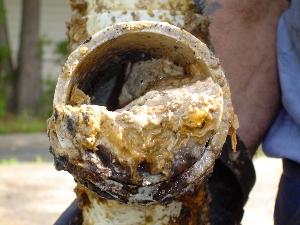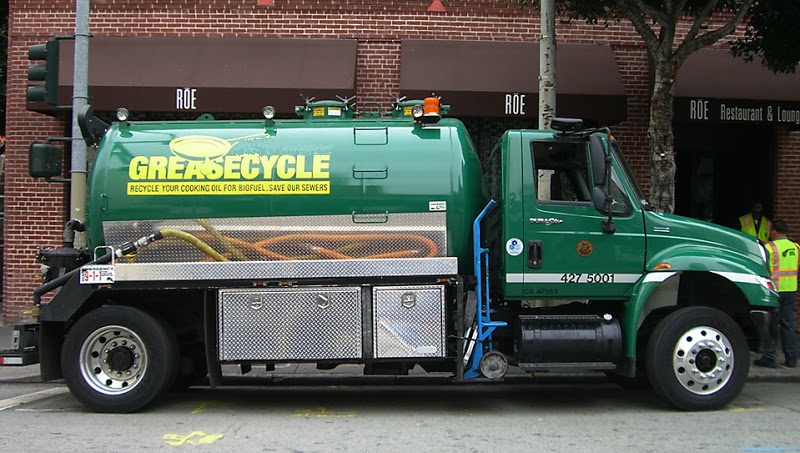We Build Relationships with our Clients
Greasecycle® is the professional in grease trap cleaning & pumping in Cary, NC. We help you to avoid drain back ups and spills. Greasecycle® is 100% certified to remove your used cooking oil from your facility AND permitted by the North Carolina Department of Environmental Quality (NCDEQ). We regularly service the entire Cary area, as well as the surrounding cities such of Durham, Raleigh, Apex, Garner, and Chapel Hill.
Whether you're looking for grease trap cleaning for your restaurant, school, nursing home, or industrial facility we are able to accommodate your service needs . Our trained technicians will expertly remove the cooking oil from your grease trap and deliver it to our state of the art recycling facility.
At our recycling facility, the mixture of grease, water, and food particles are professionally processed into compost and biofuel. Call us today to learn more about our services and to schedule your grease pumping appointment.
Contact Us To Learn More
More About Greasecycle® in Cary
Greasecycle®: Professional Grease Pumping Service in Cary, NC
Our highly trained technicians frequently service Cary area restaurants and commercial food establishments to meet their grease trap cleaning needs. When you clean your grease traps with Greasecycle® you're not only maintaining your grease traps, you're helping the environment.

Warning Signs Your Grease Trap Needs to Be Cleaned
Is your grease trap showing any of the following warning signs?:
- Foul Odor - if you're experiencing a foul odor in your kitchen DO NOT WAIT It is time to give us a call! A foul odor is the greatest indicator that your grease trap is about to overflow.
- Slow Drainage - Is the water in your sink slow to drain, or completely blocked? If so, there is a good chance that your grease interceptor needs maintenance.
- Low Water Level - A full grease interceptor can be the cause of low water levels in your toilets.
How Often Should Your Grease Trap Be Cleaned?
According to the regulations of the city of Durham, all grease removal systems need to be cleaned on a monthly schedule. A more frequent cleaning schedule is required if a user’s discharge contains more than 250 mg/L of fat, oil, or grease. A less frequent cleaning can be arranged if it can be demonstrated to the City that the 250 mg/L limit can be met with the proposed cleaning schedule.
Greasecycle® will implement a schedule of service frequency for your specific kitchen that will help you prevent drain backups and overflows. Greasecycle®'s automatic grease trap pumping services will allow you to set it and forget it..

Service Pricing
Pricing varies. It is dependent on the size of the grease trap or interceptor, its accessibility, and how frequently it needs to be cleaned. Cost per visit is generally decreased when service calls are more frequent. A more accurate price quote can be determined by informing us of the size and location of your grease trap.
Typically, indoor grease interceptors are 30 gallons or 60 gallons in volume.
Outdoor grease interceptors are usually 1000 gallons or 1500 gallons in size.
Contact Us To Learn More
Put Your Trust in Greasecycle®!
- We remove all grease and food solid waste
- We aim to service your establishment at times that minimize business interruption
- We help your business stay in compliance with current regulations by leaving proper manifest paper work.
- We maintain complete records of our service calls to your grease traps
- Much of the material we remove is repurposed - used in anaerobic digestion to increase methane for electricity generation, or as a soil amendment used for non-edible agriculture
- Material that we cannot repurpose is safely disposed of at licensed facilities according to local regulations
Proudly Servicing the Following Areas:
Proudly providing grease trap cleaning services in Raleigh, Durham, Cary, Chapel Hill, Greensboro, High Point, Winston Salem, Charlotte, Greenville, Spartanburg, Columbia, Richmond, Hampton Roads, Virginia Beach, Henrico County, Newport News, Mechanicsville, Portsmouth, Arlington, Centreville, Alexandria, Norfolk and Chesapeake.

Durham Area Information
Cary is the seventh-largest municipality in North Carolina. Cary is in Wake and Chatham counties in the U.S. state of North Carolina. Located almost entirely in Wake County, it is the second-largest municipality in that county and the third-largest municipality in The Triangle after Raleigh and Durham. The town's population was 135,234 as of the 2010 census (an increase of 43.1% since 2000), making it the largest town and seventh-largest municipality statewide. The U.S. Census Bureau estimates the town's population to be 159,769 as of July 1, 2015. Cary is the second most populous incorporated town (behind only Gilbert, Arizona) in the United States.
According to the US Census Bureau, Cary was the 5th fastest-growing municipality in the United States between September 1, 2006, and September 1, 2007. In 2015 Cary had a low crime rate of 84 violent crimes per 100,000 residents. Charlotte, the largest city in North Carolina, had a violent crime rate of 648 violent crimes per 100,000 residents, almost 8 times higher than Cary.
Raleigh, Durham, and Chapel Hill make up the three primary metro areas of the Research Triangle metropolitan region. The regional nickname of "The Triangle" originated after the 1959 creation of the Research Triangle Park, primarily located in Durham County, four miles from downtown Durham. RTP is bordered on three sides by the city of Durham and is roughly midway between the cities of Raleigh and Chapel Hill, and the three major research universities of NC State University, Duke University, and UNC-Chapel Hill. Source: Wikipedia